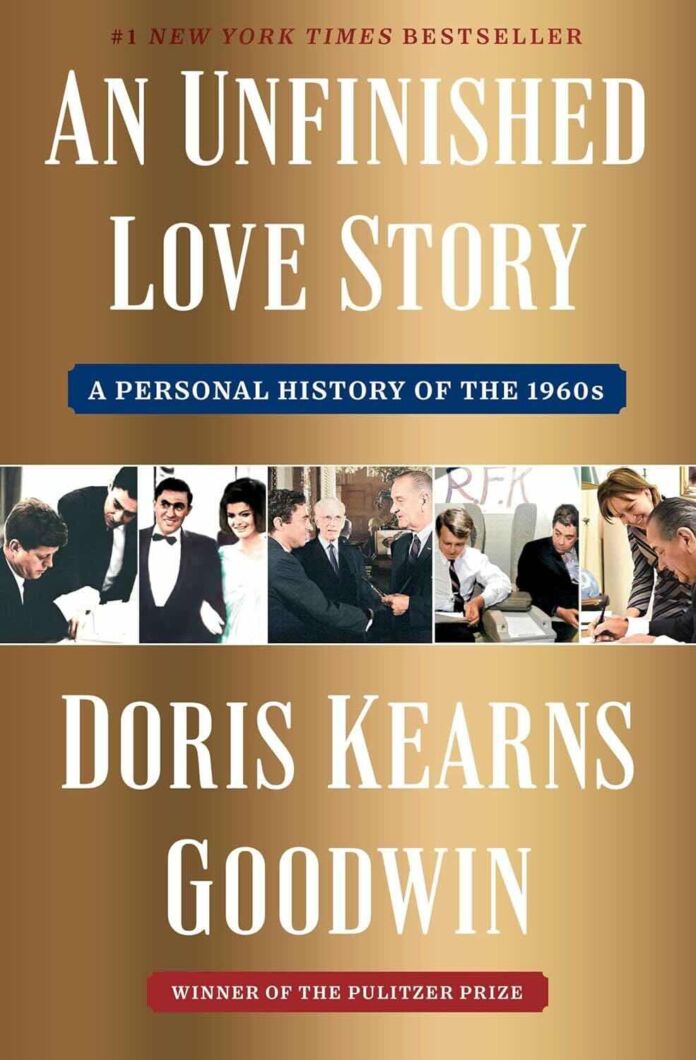In this deeply personal yet historically resonant memoir, An Unfinished Love Story, Pulitzer Prize-winning historian Doris Kearns Goodwin takes readers on an intimate journey through one of America’s most transformative decades. The book masterfully interweaves three compelling narratives: a love story between two remarkable individuals, a behind-the-scenes chronicle of pivotal moments in American history, and a poignant account of a couple’s final project together as they explore an extraordinary archive of the 1960s.
The Last Great Adventure
At its heart, An Unfinished Love Story chronicles the author’s exploration of her late husband Richard Goodwin’s meticulously preserved collection of letters, documents, and memorabilia from his years as a key figure in both the Kennedy and Johnson administrations. What began as a daunting task of sorting through over 300 boxes becomes a profound journey of discovery, allowing the couple to revisit and reassess watershed moments they experienced from different vantage points.
The timing of this project proves particularly meaningful, as Dick Goodwin faces declining health in his eighties. Yet his enthusiasm for diving into this treasure trove of history remains undimmed. Through their conversations and reflections, we witness how this final shared adventure brings new understanding and even healing to long-held differences in their perspectives on the era’s leaders and events.
A Tale of Two Perspectives
One of the book’s greatest strengths lies in its dual viewpoint narrative. Dick Goodwin served as a close advisor and speechwriter to both JFK and LBJ before becoming disenchanted with Johnson’s escalation of the Vietnam War. Doris Kearns, meanwhile, worked directly with LBJ in his post-presidential years, developing deep insight into his complex character and legislative achievements. Their differing experiences with Johnson created occasional tension in their marriage but ultimately enriched their understanding of this pivotal period.
Historical Revelations and Intimate Moments
The archival materials yield fascinating new details about watershed moments of the 1960s. We get an insider’s view of the crafting of iconic speeches like JFK’s “New Frontier” address and LBJ’s “We Shall Overcome” speech following the Selma march. The author brings these moments alive through vivid scene-setting and carefully chosen details that illuminate both the public drama and private dynamics at play.
Strengths and Notable Aspects
- Masterful integration of personal and political narratives
- Fresh insights into key historical figures and events
- Compelling portrait of a marriage of minds
- Rich use of primary source materials
- Elegant, accessible prose style
Areas for Improvement
- Some readers may wish for more details about the couple’s personal life outside of politics
- The chronological jumps between decades can occasionally feel disorienting
- Certain political figures and events could benefit from more context for younger readers
- The focus sometimes strays from the central narrative of exploring the archives
Literary Craftsmanship
Goodwin’s prose demonstrates why she remains one of America’s most celebrated historical writers. She moves effortlessly between intimate domestic scenes and sweeping historical narrative, maintaining both emotional resonance and scholarly insight. Her portrayal of complex figures like LBJ shows remarkable nuance, acknowledging both his legislative genius and his darker aspects.
Historical Context and Contemporary Relevance
The author draws subtle but powerful parallels between the social movements and political divisions of the 1960s and contemporary challenges. Without forcing direct comparisons, she illuminates how that era’s struggles for racial justice, economic equality, and democratic ideals continue to resonate today.
In the Context of Goodwin’s Other Works
Readers familiar with Goodwin’s previous works like Team of Rivals and Leadership in Turbulent Times will recognize her gift for humanizing historical figures while maintaining scholarly rigor. This book breaks new ground, however, in its more personal approach and its focus on events she witnessed firsthand.
Final Assessment
An Unfinished Love Story succeeds brilliantly on multiple levels—as memoir, as history, and as a meditation on marriage, memory, and the American experience. While not without minor flaws, it represents a worthy addition to Goodwin’s distinguished body of work and offers valuable insights for both students of history and general readers.
The book is an excellent read for its compelling blend of personal and political history, though occasionally uneven pacing and assumptions about readers’ historical knowledge prevent it from achieving absolute perfection.
Similar Works and Recommended Reading
Readers who enjoy this book might also appreciate:
- My Life with the Kennedys by Arthur M. Schlesinger Jr.
- The Years of Lyndon Johnson series by Robert Caro
- A Promised Land by Barack Obama
- Personal History by Katharine Graham
For Further Exploration
For those interested in diving deeper into this era, Goodwin’s earlier works Lyndon Johnson and the American Dream and No Ordinary Time provide excellent companion pieces to this more personal narrative.
The book ultimately reminds us that history is not merely a collection of facts and dates but a living tapestry woven from individual lives, relationships, and choices. In sharing this intimate portrait of her final project with Dick Goodwin, Doris Kearns Goodwin has created both a moving testament to their shared passion for American history and an invaluable contribution to our understanding of a transformative decade whose lessons and unfinished business continue to shape our present moment.





